THE MALAYSIAN DILEMMA -
THE DISEASE AND THE CURE
by D.P. Pangai
13.Sep.1998They were speedily replaced by Mahathir’s choices and the national media is now back to toeing the official UMNO party and government line with an assiduity which would surprise even the most obsequious of sycophants. It is little wonder then that people resort to spreading rumours on the Internet, when the local media is seen as nothing more than a propaganda mouthpiece of the government.
While the spreading of rumours cannot be supported and must in fact be condemned, the government which has denied the existence or possibility of riots has itself not fully explained the unusual presence of Federal Reserve Unit riot police in the Chow Kit area on the day in question. Perhaps their presence in fact deterred the occurrence of the riots which would otherwise have occurred, in which case the rumour-spreaders actually did the authorities a favour (notwithstanding the widespread panic in the capital city which they also caused in doing so). So far, it is not known whether these rumours were deliberately spread by those arrested or were spread in a well-meaning but misguided attempt to warn.
UMNO has since its last General Assembly determined and established that corruption, cronyism and nepotism do not exist in Malaysia, contrary to what most ordinary Malaysian know and feel the effects of every day. Malaysia is therefore the cleanest country in the whole world in this respect, if Mahathir is to be believed.
Zahid Hamidi, the UMNO Youth leader and a staunch Anwar ally, who made the allegations of cronyism and nepotism being practised by the government at the last UMNO General Assembly, was practically forced to retract the same and admit that there was no such thing (after Mahathir had displayed and published a list of hundreds of Malay beneficiaries of special public-listed company share issues and government privatization projects (a list in which Zahid himself appeared).
Mahathir himself made the announcement of this retraction after an UMNO Supreme Council meeting and both Zahid and Anwar (and their supporters) have since then effectively been silenced. Anwar and his men were thus seen to have been deftly emasculated by the good doctor. Swifter and more brutal surgery had never been performed in the Malaysian political arena. The mopping up, though, appears to have been overdone but then overkill has always been Mahathir's forte. Malaysians cannot plead ignorance, neither can they say they have not been warned. Expect no quarter from Mahathir and give none to him.
Now that Anwar is out of UMNO, what will he do and is it possible that his supporters will continue to follow him out as well? Is a new political party in the offing? Or will Anwar join PAS where he should rightfully belong, allegations of misconduct notwithstanding. What is sure is that he needs a far better strategy against Mahathir than that which he has employed thus far. Are there any in his "team" who are capable of working out such strategy?
Can Anwar and his team avoid making the sort of tactical and strategic mistakes which Mahathir will only be too pleased to exploit to the fullest? Much is at stake, both for the victors as well as for the vanquished. For the people of Malaysia, their future now remains to be determined by the outcome of the battle between the corrupt status quo and the hopeful reformation.
The Malaysian English and Malay media were thus also castrated in one fell sweep, allowing Mahathir to say what he liked locally and be reported in the newspapers and on TV without even the slightest hint of any dissent. The great cover-up which had experienced a few prior hiccups was thus able to recommence with gusto. As will be seen, the government had a lot to cover up.
Malaysians are now resorting to the coffee shops and stalls for the "real" news, which isn’t good news for the government either, since Mahathir’s ears would probably burn if he heard what they (especially the Malays) have to say. Perhaps the government should now resort to banning coffee shops and stalls.
Technically legally speaking, any gathering of more than 4 persons in public can constitute an illegal assembly under Malaysian law and requires a police permit. Anwar has been reminded of this - Mahathir would of course seek any opportunity to add illegal assembly to the unprecedented host of crimes which Anwar - an avowed Islamist - is alleged to have committed, from high treason and leaking of state secrets to sodomy, illicit sex, attempted seduction, tampering with witnesses and evidence, obstruction of justice, and abuse of power. Some wags would say that these are quite regular features of many other Ministers and Members of Parliament in Mahathir's government.
Whatever it is, Anwar has not been charged with anything yet.
Control of the media has allowed the government to push the disingenuous and utterly false message that "unpatriotic" locals are undermining the government and the country, as Daim was recently reported as saying that "the most damaging element for the nation is probably unpatriotic people "selling" negative and untrue information about the country to representatives of foreign media" (New Straits Times, 16.8.1998).
Was this merely aimed at Anwar and his boys or was Daim laying the scenario for Mahathir’s bigger hidden agenda?
It is of course easy for the government in power (and in full control of the local media) to tar and feather even constructive critics as being "unpatriotic" and traitors to the nation, in spite of the mounting evidence that it is in fact those in the government themselves who have abused their positions, are unpatriotic and the real traitors. They are the ones who are the real damaging element for the nation. Patriotism is always the last refuge of scoundrels when they have nothing else left to hide behind. This is one of the natural rules of the neo-feudal politics of power practised by Mahathir, another being "divide and rule" (while pushing a purported agenda of unity).
Anwar’s medicine in combating the economic crisis was undoubtedly bitter and being somewhat misguided led to almost immediate contraction of the economy. Instead of helping the situation, he probably made matters worse. That his policies closely resembled those of the IMF was not seen as a coincidence. Many ordinary Malaysians suffered (and continue to suffer) the results of a fierce liquidity and credit crunch, which the government initially denied even existed.
Mahathir’s and Daim’s cronies were the hardest hit by the Malaysian Central Bank, Bank Negara’s decision to reduce the non-performing loan limits from 6 months to 3 months (non-servicing of interest or loan repayment) ostensibly to be line with international norms. House, hire purchase, project and personal financing came to almost complete standstill (and have not returned to any sense of normalcy) while Malaysians battled against rising interest rates, rapidly deteriorating share prices, falling currency values and uncertainty of property values. Infrastructure projects were put on hold and many prestigious projects such as the Kuala Lumpur monorail stopped for lack of continued funding.
Spending on the facilities for the Commonwealth Games went on, however, as the government strived to find some justification in continuing with the Games to save the tremendous loss of face and goodwill abandoning the Games would entail, in spite of the growing realization that many Malaysians were becoming increasingly unable to afford even the cost of tickets to the Games. Free tickets galore were made available to the disadvantaged, but many could not even afford (or be bothered) to turn up at the Games' various venues.
Anwar was given the nickname "Mr. IMF" by Dr. Mahathir in UMNO and openly criticized for toeing the line and echoing the criticism of diabolical foreigners who wished to destabilize and control Malaysia’s economic and political sovereignty. While no doubt Mahathir had his own agenda (chiefly his own political survival and the economic survival of his cronies upon whom he depended) in making these allegations, Anwar’s image has taken a drastic beating (coupled with the as-yet unproven - notwithstanding the existence of the purported affidavits, witness and other evidence - allegations of bisexual misconduct against him in a book "50 Dalil Kenapa Anwar Tidak Boleh Jadi PM" or "50 Reasons Why Anwar Cannot Become PM" widely distributed for free by the official party machinery itself amongst UMNO members at the last General Assembly and which has now become subject of a court case for libel with the court granting an injunction against further distribution until disposal of the case). The judge who granted the injunction was inexplicably transferred out of Kuala Lumpur at short notice.
Many Malaysians were beginning to feel that Anwar was a lame duck and unlikely to become Prime Minister notwithstanding his subdued protestations to the contrary at the time. His sacking from the government has probably given him a far better opportunity to push the Reformasi agenda from outside rather than within.
Mahathir’s resumption of "full control" has allowed him to prescribe a different and apparently more palatable (yet still equally ineffective) medicine for Malaysia’s economic malaise. The good doctor’s medicine was no longer working, however, and there are no signs that it will continue to be palatable - on the contrary there are indications that Mahathir in his usual dictatorial style will force-feed that medicine down the throats of Malaysians (and the rest of the world as well) whether it is the right medicine or not. It may even turn out to be poison, and the worst fears of most Malaysians will thus be realized.
While all this political drama is taking place, Malaysia’s economic woes continue to remain unresolved and the situation has even deteriorated further and will most likely continue to do so. The Malaysian Institute of Economic Research made the statement a few days before the UMNO General Assembly that the worst is yet to come, a feeling shared by most Malaysians. Malaysians are now left wondering when the final crunch will come and just how bad it will be.
Mahathir on his part has promised (or threatened) as yet unspecified "shocking" measures (currency restriction is so far among the first to be unveiled) to deal with the economic problems - measures requiring the people’s unwavering support and confidence as he put it. Which comes first, effective action by the government which restores confidence or confidence that will allow the government to take effective action? Can Malaysians really have confidence that their government can actually take effective action? Many doubt it.
Perhaps Mahathir is considering repealing the law of supply and demand. Or is he considering declaring a state of national emergency, thereby suspending Parliament and the Cabinet, not to mention the will of the people? Whatever it is, Malaysians will not take too kindly to any further shocks. Some of it we now know, others we can hazard a few good guesses, since Mahathir’s options are limited, bearing in mind that he has to keep his men as well as Daim and Daim’s boys happy.
As the subdued as well as open voices of discontent among Malaysians keep growing by the day, the government’s response has been to deny flatly all allegations of misconduct or mismanagement on its part and crack down on dissent. The use of the term "Divine Retribution" or bala’ has been unofficially banned from the mosques, since this would cast the blame for the economic crisis on wrongdoing by the government and its cronies.
The thick haze originating from large-scale burning and forest-clearing in Indonesia which enveloped a large part of Malaysia as well for a couple of months and which started at about the same time as the economic crisis last year also led to the unofficial banning of the term "haze" or jerebu and all discussion of it from the mosques, since this was again associated with Divine Retribution (of greater concern to the government was probably the fact that too much publicity about the haze would adversely affect the Commonwealth Games, Divine Retribution notwithstanding).
These unofficial bans are being enforced by the presence of Special Branch police undercover officers who report any infringement on the part of the khatib delivering the khutbah (sermon). The khatibs and imams are now mostly being seen delivering rather tame sermons, and even resorting to the official even tamer sermons provided by the BAHEIS (Bahagian Hal Ehwal Islam), the Islamic Affairs Division also known as Pusat Islam or the Islamic Centre of the Prime Minister’s Department.
The prolonged water shortage or crisis in many parts of the capital city, Kuala Lumpur and the surrounding Klang Valley area was again also attributed to Divine Retribution and added to the government’s woes, as did losing the parliamentary seat of Arau, Perlis to PAS in a recent by-election.
The Kuala Lumpur Stock Exchange key Composite index has recently hit a new 10-year low of 250+ points, from the 1,200+ points it used to enjoy before the crisis. More than 25 public-listed companies which are insolvent or facing severe losses and cash-flow problems have sought court protection from creditors pursuant to proposed "schemes of arrangement". Many more will follow, yet the government does not appear to have any proper response other than to form Danaharta Nasional Berhad, the Asset Management Corporation, to take over non-performing loans and their related assets from banks, and attempt to "jump-start" the economy by pumping large sums of money into "strategic" infrastructure projects through a so-called Dana Pembangunan Infrastruktur or Infrastructure Development Fund.
(To be continued...Part 3)


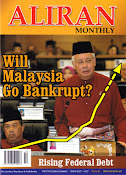








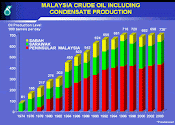
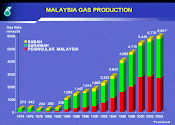




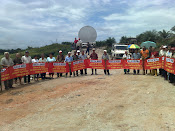





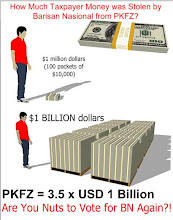


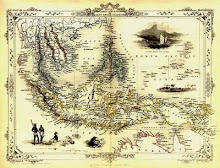
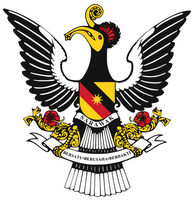










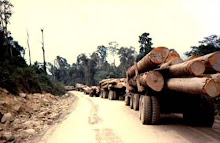


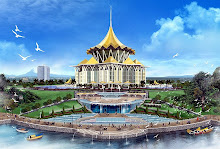




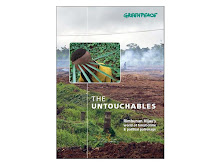

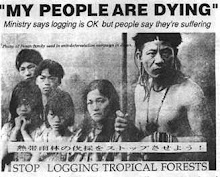

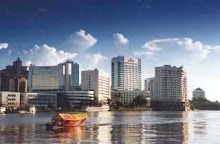
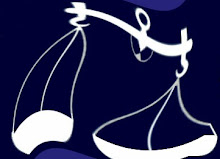


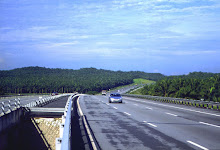





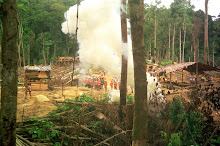



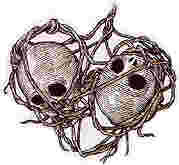
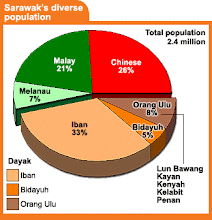

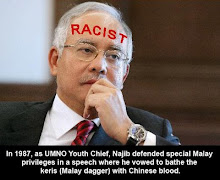

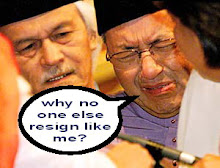

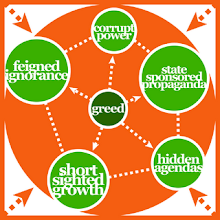



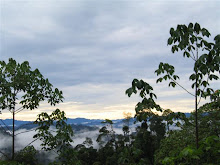



No comments:
Post a Comment